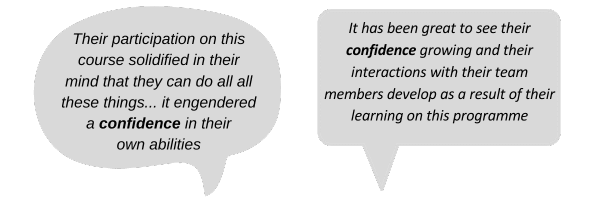…and why that’s so important!
Evaluating the impact of our work is always a priority for us. When we explore the impact that our Level 3 and Level 5 Management Apprenticeship programmes have on the work and careers of our learners, there is one area of improvement that comes up time and time again: confidence.
It’s probably the element that comes up most regularly when we ask apprentices’ line managers to reflect on the changes they have seen in their work and performance:



And it’s also something that comes up from our apprentices themselves, when we ask them to reflect on their learning experiences:


So, as a method of learning, why are apprenticeships so effective at building confidence?
Hands-on experience
Apprenticeships provide practical, hands-on experience in a real work environment. Whether they are at the very beginning of their careers or, like many of our apprentices, are learning from a place of existing experience, there is constant focus on applying new approaches in their role and deploying new (or enhanced) skills in their day-to-day role.

So much of what makes us confident in any area of our lives is experience. The first time trying anything will almost certainly be the least confident version of it, whether that’s riding a bike, hitting a golf ball or chairing a meeting! The ‘learning by doing’ that apprenticeship programmes encourage allow learners to build their confidence one step at a time, in all the most important areas.
Every time an apprentice is able to stop and think “I know just what to do here,” their confidence grows – it is these moments that their programme of learning is designed to bring about, with increasing regularity.
Coaching & Mentoring
Apprenticeship programmes involve working closely with Tutor/Coaches who provide support, feedback, coaching and career guidance, all in aid of increasing confidence.

Our programmes also signpost the importance of our apprentices’ relationships with their line managers. We inform and involve line managers to get them as engaged as possible with the apprentice’s development journey and – if practical – take on as much of a mentoring role as they are comfortable with.
Feedback
Feedback is an essential element of an apprenticeship programme. Learner progress reports (from which the line manager quotes above were taken), professional discussions, assessment feedback and the learning workshops themselves are all good places for apprentices to learn about the effectiveness of their efforts. Just as learners need to deploy their learning in the ‘real world’ in order to grow confidence, they also need to find out how well it’s going to do the same.

Constructive feedback – or even positive feedback delivered in the wrong way or at an inappropriate time – can rapidly erode confidence that may have taken a long time to build up. As such, apprenticeship programmes are designed to structure feedback in such a way that avoids this – something that Eliesha’s programme tutor/coaches, apprenticeship support team and accredited centre staff understand and take great care to see borne out.
Progression & Achievement
Apprenticeship standards come with a clear set of requirements; topics in which learners will be expected to evidence development of knowledge, skills and behaviours. As with any programme of development, absolute confidence will not be achieved overnight so, instead, by progressing through clearly communicated stages and steps, apprentices feel a growing sense of achievement as they learn. For Eliesha’s Management Apprenticeship programmes, we purposely signpost the achievement of each step, helping our learners to feel confident that they are developing, making progress, and on track for success.
Recognition
Finally, don’t underestimate the confidence-building impact of apprentices being recognised for their accomplishment and achievement. Even through sharing the news with colleagues, contacts, friends and family, apprentices will head into the next stage of their career with a sense of pride and confidence, that they have equipped themselves with skills, knowledge and behaviours that will help them for the duration of it.

Particularly in the context of Impostor Syndrome, something we are becoming increasingly aware is both widespread and damaging, providing individuals with externally-verified, widely-respected and permanent endorsements of their success and achievement will replace feelings of self-doubt with self-confidence.
With these varied ways that apprenticeship programmes allow managers to build their confidence, why then is that such an important trait to have in their role?

Decision-making: Managers are responsible for making the important decisions that impact the success of their teams and organisations. Being confident in their decision-making abilities can help managers make informed and effective decisions – sometimes it’s less important that the decision is the right one, and more important that the manager in question had the confidence to make one at all (and in time).

Leadership: Managers are expected to lead and inspire their people to achieve their goals – both personal goals and strategic objectives. Confidence begets credibility, which is a solid foundation for earning the respect and trust of their team members. Good, self-reflective leaders ask themselves “why should anyone be led by me?” Confidence is a good place to start.

Communication: Managers need to communicate effectively with their team members, as well as with other stakeholders like customers, partners and senior leaders. Confidence helps managers communicate their ideas clearly and persuasively, and can help them handle difficult conversations or challenging disagreements with ease.

Resilience: Managers will never be without some challenges in their roles. Whether these arise from their team members, their customers or elsewhere entirely, being confident in their ability to handle them means they are better able to stay resilient and recover bounce back from setbacks. A confident manager is more likely to maintain the positive attitude and stoutness of mind to persevere through difficult times.

Role-modeling: Managers set the tone for their team’s culture and behavior. A confident manager can inspire their team members to take on new challenges and try unfamiliar approaches, which can lead to increased productivity and success.
Open Apprenticeship Programmes – June 2023 Start
Level 3 (Team Leader/Supervisor) & Level 5 (Operations/Departmental Manager)
The next opportunity to enrol your managers and leaders on our popular management apprenticeship programmes is right around the corner – we have spaces on ‘open’ programmes at both levels, with induction in June 2023.
Contact us to find out more and explore how management apprenticeships can help you to access high quality, practical training in topics like the below for your existing managers and leaders.